 Petzlover
Petzlover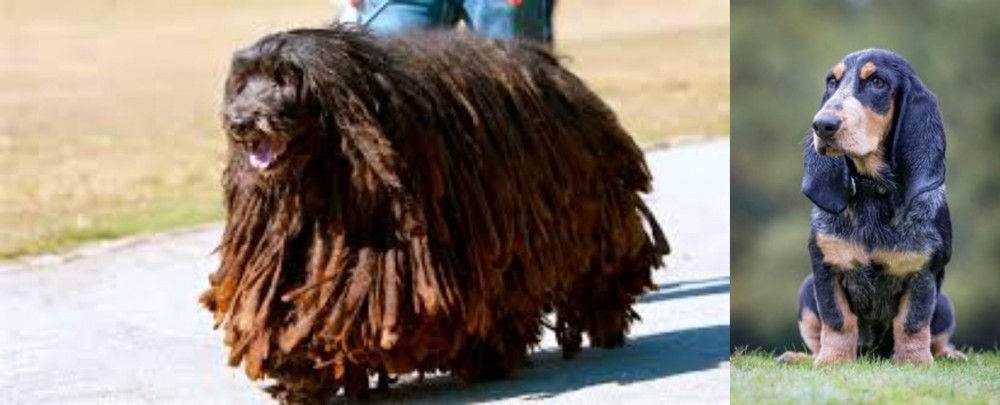 Bergamasco is originated from Italy but Petit Bleu de Gascogne is originated from France. Both Bergamasco and Petit Bleu de Gascogne are having almost same height. Bergamasco may weigh 18 kg / 40 pounds more than Petit Bleu de Gascogne. Both Bergamasco and Petit Bleu de Gascogne has almost same life span. Bergamasco may have more litter size than Petit Bleu de Gascogne. Bergamasco requires Moderate Maintenance. But Petit Bleu de Gascogne requires Low Maintenance
Bergamasco is originated from Italy but Petit Bleu de Gascogne is originated from France. Both Bergamasco and Petit Bleu de Gascogne are having almost same height. Bergamasco may weigh 18 kg / 40 pounds more than Petit Bleu de Gascogne. Both Bergamasco and Petit Bleu de Gascogne has almost same life span. Bergamasco may have more litter size than Petit Bleu de Gascogne. Bergamasco requires Moderate Maintenance. But Petit Bleu de Gascogne requires Low Maintenance
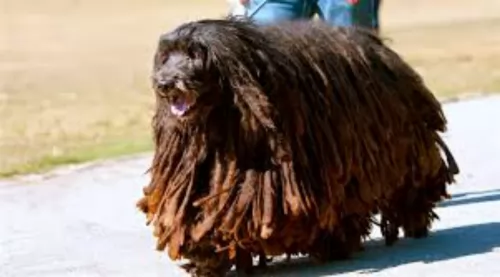 The Bergamasco comes from northern Italy. This medium sized sheepdog is of ancient origin. Known as an Italian sheep herding breed, his name actually comes from the town where he comes from - Bergamo.
The Bergamasco comes from northern Italy. This medium sized sheepdog is of ancient origin. Known as an Italian sheep herding breed, his name actually comes from the town where he comes from - Bergamo.
It was after World War II that there was danger that this breed would disappear as the need for herding and shepherding was diminishing. An Italian breeder, however, Dr. Maria Andreoli, stepped in to save the breed.
It was in 2015 that the American Kennel Club also changed the breed’s status from Miscellaneous to the Herding Group.
 The Petit Bleu de Gascogne is a scenthound dog originating in France where he has always been used as a hunting dog.
The Petit Bleu de Gascogne is a scenthound dog originating in France where he has always been used as a hunting dog.
The Petit Bleu de Gascogne is a descendant of the Grand Bleu de Gascogne. This dog was developed around the 16th century already, with the numbers of the dog being reduced at the time of the World Wars.
They’re quite well known in France, but not in any other parts of the world. The dog is an official member of the UKC, and it was in 1991 that the dog joined their scent hound group.
 This medium sized sheepdog stands 54 – 62cm in height and weighs up to 38 kg as an adult. It is his coat which draws the most attention. It is of a coarse texture and actually greasy to the touch. It actually forms into strands or almost like dreadlocks from the top of the body, so that people agree he is one of shaggiest dog breeds there are.
This medium sized sheepdog stands 54 – 62cm in height and weighs up to 38 kg as an adult. It is his coat which draws the most attention. It is of a coarse texture and actually greasy to the touch. It actually forms into strands or almost like dreadlocks from the top of the body, so that people agree he is one of shaggiest dog breeds there are.
From age 1 on the coat starts to become woolly, and then the flocks start to form. As these clumps of hair appear, it will become necessary to separate them into smaller cords by hand to ensure attractive formation Brushing isn’t necessary but a big toothed comb can keep their hair ‘groomed’.
The colour of the coat is solid grey with patches of shades of grey and sometimes black. His dense, heavy coat makes it that he is suited to cooler climates. Because he is a herding dog, he wouldn’t do well in an apartment but would suit a home with a large garden.
He is intelligent and social but will need firm handling as he is a boisterous dog. He has a muscular yet compact body with a large head, long tail, high-set semi-drooping ears and large, gentle looking brown eyes. Although not instinctively aggressive, he makes an excellent watch dog with strong protective instincts to protect his human family.
He views new people into his circle with suspicion and wariness. He is good with kids and pets in the home and is playful and energetic.
 The Petit Bleu de Gascogne is a medium to large sized dog which stands at between 52 to 58cm in height at the withers and weighs in the region of 18 to 22kg.
The Petit Bleu de Gascogne is a medium to large sized dog which stands at between 52 to 58cm in height at the withers and weighs in the region of 18 to 22kg.
In fact, the only difference between the Petit Bleu de Gascogne and the original Bleu de Gascogne is its size. They’re well proportioned dogs and they have lean, muscular bodies. The head is long and slim, the nose black, the expression gentle and unthreatening.
Most times you’ll find a black patch on each side of the head which extends to the ears so that the ears are essentially black. The patch also extends to around the eyes.
The dense, short coat is a typical trademark feature, with the color of the coat being white mottled with black so that the general appearance is a slate blue color. The dog usually has tan eyebrows over each eye. The tail is long and the ears long and floppy.
Kept essentially as a pet today, the Petit Bleu de Gascogne has kept its hunting instincts and is an excellent scent-dog, being able to follow a scent for miles. It is why you want to ensure that as a pet, you take him on regular walks, every day in fact. He just loves to get out, and given the chance to run and chase a scent.
Apart from his hunting skills, he still makes an excellent pet, being loyal and loving with his human family. He is looked upon as being amicable and well-balanced, getting on well with children as well as dogs in the home.
They’re quite laid-back and friendly, so they don’t make particularly good watchdogs. They are independent and intelligent and will respond well to training and socialization.
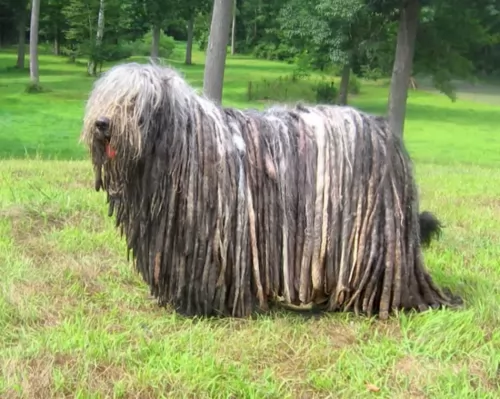 This is a working dog so they are naturally alert. He is also intelligent and independent and this independence is seen with training as he doesn’t take easily to following instructions, becoming stubborn. You’ll certainly want to have your Bergamasco socialized and trained as he can be a boisterous dog, bounding with energy.
This is a working dog so they are naturally alert. He is also intelligent and independent and this independence is seen with training as he doesn’t take easily to following instructions, becoming stubborn. You’ll certainly want to have your Bergamasco socialized and trained as he can be a boisterous dog, bounding with energy.
This is a dog that will need to be kept busy and provided with plenty of activities so that he remains happy, playful and relaxed.
Lively and intelligent, these dogs also form strong bonds with their owners and get on well with the children in the home. He will take well to country life as opposed to living in the city.
 The Petit Bleu de Gascogne just loves being outdoors, chasing the scent of something interesting. He is in his element outside as a hunting or tracking dog.
The Petit Bleu de Gascogne just loves being outdoors, chasing the scent of something interesting. He is in his element outside as a hunting or tracking dog.
Training and socialization will always be a good idea for these dogs, as once on the scent he may be inclined to ignore your calls and not return easily.
They’re easy-going dogs, loving be around their human family. Provide well for him and you will find that he makes an amicable, loyal and devoted companion.
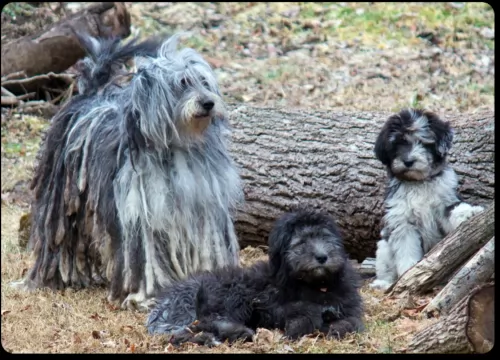 Your Bergamasco can live to be 13 to 15 years of age and he is considered to be a healthy breed. Nonetheless you want to be aware of health issues that are common to this breed
Your Bergamasco can live to be 13 to 15 years of age and he is considered to be a healthy breed. Nonetheless you want to be aware of health issues that are common to this breed
he is vulnerable to heat. He can die of heat exhaustion quicker than other breeds
keep an eye on him for hip dysplasia, progressive retinal atrophy and skin allergies
 The Petit Bleu de Gascogne is a healthy dog with no unusual health problems being documented. With good care, he can generally live to be 11, 12 or 13 years of age. Nonetheless it is a good idea to be aware of some of the horrible dog illnesses that can strike, even though it is highly unlikely.
The Petit Bleu de Gascogne is a healthy dog with no unusual health problems being documented. With good care, he can generally live to be 11, 12 or 13 years of age. Nonetheless it is a good idea to be aware of some of the horrible dog illnesses that can strike, even though it is highly unlikely.
Your Petit Bleu de Gascogne is a deep chested dog and this simply means it can develop bloat. A swollen stomach, lethargy and trying to vomit are just some of the signs of this ailment which can become deadly if not attended to. The stomach can twist with bloat and this is when things get serious.
Floppy eared dogs are always at risk of ear infections and these can be painful for your pet. You will notice him scratching at his ears or shaking his head and then its time to investigate further for redness or discharge.
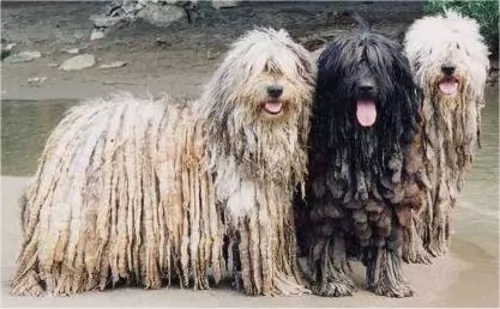 The Bergamasco isn’t a shedder but his coat will need to be combed once a week just to keep it in order. You don’t want to bath him too often, especially during the Winter as his coat takes a long time to dry. It isn’t recommended to shave a Bergamasco as the coat regulates the dogs temperature – keeping him warm and cold as the weather demands.
The Bergamasco isn’t a shedder but his coat will need to be combed once a week just to keep it in order. You don’t want to bath him too often, especially during the Winter as his coat takes a long time to dry. It isn’t recommended to shave a Bergamasco as the coat regulates the dogs temperature – keeping him warm and cold as the weather demands.
They thrive on a blend of kibble (dry) mixed with raw and-or moist food once or twice a day. Remember to include quality chicken, turkey, etc. mixed with some vegetables and rice into your dog’s diet. Ensure a constant supply of fresh water in an easily-cleanable bowl.
Balls and ropes are important for building muscle strength and burning energy. Remember your Bergamasco is a working breed and will need plenty of games and exercise.
 Luckily the Petit Bleu de Gascogne is a fairly low maintenance dog who will basically require a good brush twice a week to rid him of loose hairs and to keep his coat nice and shiny.
Luckily the Petit Bleu de Gascogne is a fairly low maintenance dog who will basically require a good brush twice a week to rid him of loose hairs and to keep his coat nice and shiny.
Take the time while brushing him to test for any unusual lumps on his body. Check inside his ears too, because as a floppy eared dog, there can be a build-up of wax, debris and dampness and these can all cause bacteria and an ear infection.
Check his eyes too as well as inside his mouth. He can’t tell you when he’s got terrible tooth ache from a rotting tooth and you need to check for this. Bad teeth can cause all kinds of health issues.
There are some excellent commercially manufactured dog foods on the market which have got the vitamins and minerals your pet needs. Some of the lower quality foods have got bad ingredients such as colorants and fillers and these can actually be toxic for your pet.
It’s always wise to add a little bit of home-made food into your pet’s diet and then simple, nutritious foods such as boiled chicken, brown rice or pasta, sweet potatoes, carrots and spinach can do him the world of good. Just chop it up and add it into the dried kibble every other night when you feed your pet. A bit of raw meat occasionally can also be healthy for him.
Always ensure there’s a bowl of fresh, cool water available to him.
Ensure your pet has a nice comfortable, dry place to sleep.
Never ever leave your pet alone in a hot car.
Make sure your puppy has his puppy vaccines to avoid some life-threatening diseases.
Have your dog spayed or neutered to avoid unwanted puppies.